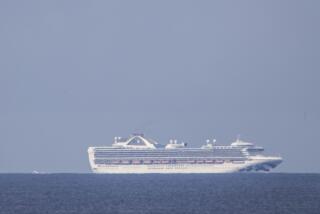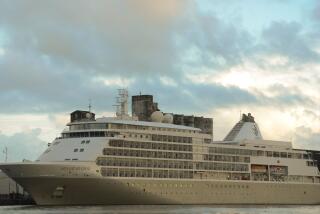Cruise insurance may cover trip interruptions but not missed destinations
The funny thing about interruption provisions in cruise insurance is that they don’t cover interruptions in itinerary.
Take the case of the Island Princess, which was two days into a 12-night Mediterranean cruise when an announcement interrupted a karaoke contest.
“Ladies and gentlemen, you may have noticed we have stopped. There is a boat in distress and we are negotiating a rescue,” passenger Jessica MacMaster recalled hearing.
The cruise had diverted from its voyage to Istanbul, Turkey, to pluck 117 people from a small, floundering sailboat. The migrants were taken onto the cruise ship July 11 and delivered the next day to the Greek mainland.
Reminding the passengers that they had probably saved lives, the captain announced that the ship no longer had time to go to Istanbul and would visit the Greek island of Santorini instead.
“You could kind of sense … that people were mad, but at the same time understood,” said MacMaster of Fort Collins, Colo. “They knew they couldn’t really voice their opinion because they had to be human.”
Although the cruise missed one of its advertised destinations, passengers who had cruise insurance policies that included trip-interruption coverage wouldn’t receive reimbursement.
As long as the passenger got what the insurance company perceives is the full value of the trip, “there is not going to be reimbursement for that missed location because there is not a financial impact that can be directly measured related to one particular location over another,” said Joe Tritz, U.S. travel product head for AIG Travel Inc., which offers insurance under the Travel Guard name.
Trip-interruption insurance would kick in on a prorated basis if the cruise were shortened due to inclement weather, illness, a strike or another approved reason. But when the cruise continues, insurance coverage doesn’t come into play even if the ship skips an advertised location.
Unlike the passengers on the Island Princess, not everyone is as accepting about being rerouted. In May, Royal Caribbean Cruises and Disney Cruise Line canceled three ships’ stops in Puerto Vallarta, Mexico, after criminal gangs fought with local authorities. About 100 passengers on one of the ships held an hour-long protest, according to postings on CruiseCritic.com.
Ocean-going cruise lines declined to give numbers on the frequency of disruptions, and the Cruise Line International Assn. doesn’t track them. Roger Frizzell, a spokesman for Carnival Corp., whose holdings include Carnival Cruise Line, Princess Cruises, Holland American Line, Cunard and Costa, among others, said the company rarely cancels stops.
A person set on a particular locale should talk to a travel agent when planning the trip to ensure that transportation to the destination will be covered by the policy. The customer should also learn if the policy will cover trip cancellation, travel delays, lost luggage, medical emergencies, trip interruption, etc. Then, the customer should make sure he or she understands the limitations of the coverage.
“Agents can be extra helpful when interpreting insurance plans, and can provide an added resource if things go wrong on a trip, or if there’s a need for a middleman with the insurance company,” said Carolyn Spencer Brown, editor in chief of CruiseCritic.com.
Despite her missed visit to Istanbul, MacMaster, a comedian who also works as a meeting planner, hasn’t soured on cruises. She notes that car trips can be affected by traffic jams, and flights are routinely canceled or delayed because of weather or mechanical issues.
“I don’t think it’s necessarily cruise-specific that your plans can be interrupted,” she said. “You never know what is going to happen.”
More to Read
Sign up for The Wild
We’ll help you find the best places to hike, bike and run, as well as the perfect silent spots for meditation and yoga.
You may occasionally receive promotional content from the Los Angeles Times.






